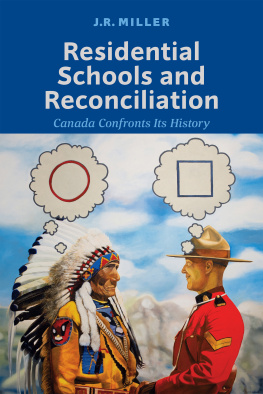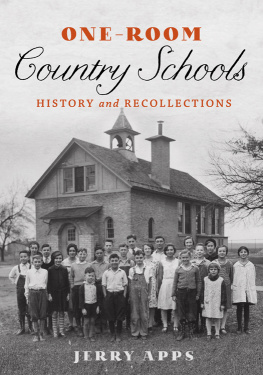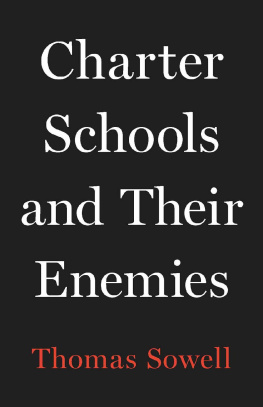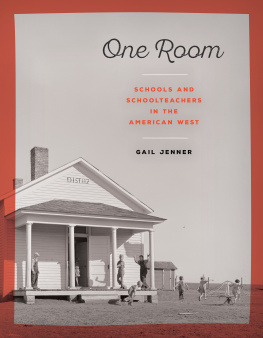Nils Christie - If Schools Didnt Exist: A Study in the Sociology of Schools
Here you can read online Nils Christie - If Schools Didnt Exist: A Study in the Sociology of Schools full text of the book (entire story) in english for free. Download pdf and epub, get meaning, cover and reviews about this ebook. year: 2020, publisher: MIT Press, genre: Politics. Description of the work, (preface) as well as reviews are available. Best literature library LitArk.com created for fans of good reading and offers a wide selection of genres:
Romance novel
Science fiction
Adventure
Detective
Science
History
Home and family
Prose
Art
Politics
Computer
Non-fiction
Religion
Business
Children
Humor
Choose a favorite category and find really read worthwhile books. Enjoy immersion in the world of imagination, feel the emotions of the characters or learn something new for yourself, make an fascinating discovery.

- Book:If Schools Didnt Exist: A Study in the Sociology of Schools
- Author:
- Publisher:MIT Press
- Genre:
- Year:2020
- Rating:4 / 5
- Favourites:Add to favourites
- Your mark:
- 80
- 1
- 2
- 3
- 4
- 5
If Schools Didnt Exist: A Study in the Sociology of Schools: summary, description and annotation
We offer to read an annotation, description, summary or preface (depends on what the author of the book "If Schools Didnt Exist: A Study in the Sociology of Schools" wrote himself). If you haven't found the necessary information about the book — write in the comments, we will try to find it.
If Schools Didnt Exist: A Study in the Sociology of Schools — read online for free the complete book (whole text) full work
Below is the text of the book, divided by pages. System saving the place of the last page read, allows you to conveniently read the book "If Schools Didnt Exist: A Study in the Sociology of Schools" online for free, without having to search again every time where you left off. Put a bookmark, and you can go to the page where you finished reading at any time.
Font size:
Interval:
Bookmark:
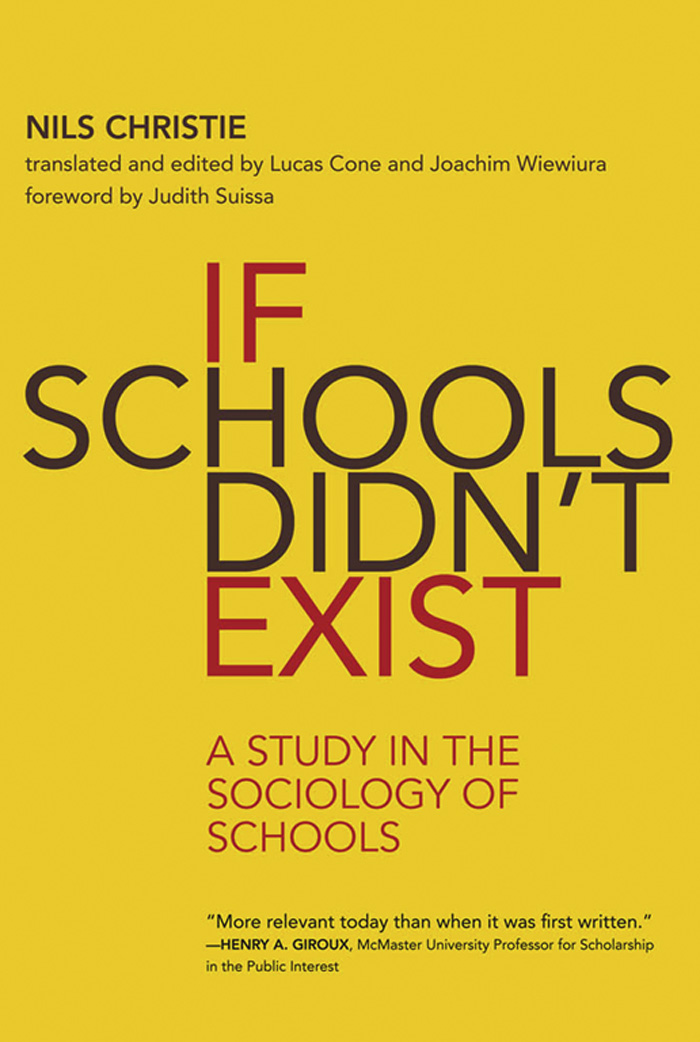

Nils Christie
Nils Christie
Translated and edited by Lucas Cone and Joachim Wiewiura
Foreword by Judith Suissa
The MIT Press Cambridge, Massachusetts London, England
This edition 2020 Massachusetts Institute of Technology
Originally published as Hvis Skolen Ikke Fantes 1971 Universitetsforlaget
This work is subject to a Creative Commons CC-BY-NC-ND license.
Subject to such license, all rights are reserved.

The open access edition of this book was made possible by generous funding from Arcadiaa charitable fund of Lisbet Rausing and Peter Baldwin.

This translation has been published with the financial support of NORLA.

All rights reserved. No part of this book may be reproduced in any form by any electronic or mechanical means (including photocopying, recording, or information storage and retrieval) without permission in writing from the publisher.
This book was set in ITC Stone and Avenir by Toppan Best-set Premedia Limited.
Library of Congress Cataloging-in-Publication Data
Names: Christie, Nils, 1928-2015 author. | Cone, Lucas, translator. |
Wiewiura, Joachim, translator.
Title: If schools didnt exist : a study in the sociology of schools /
Nils Christie ; Translated and edited by Lucas Cone and Joachim Wiewiura ; With a foreword by Judith Suissa.
Other titles: Hvis skolen ikke fantes. English
Description: Cambridge, Massachusetts : The MIT Press, [2020] |
First published in 1971-- Title page. | Includes bibliographical references and index.
Identifiers: LCCN 2019034678 | ISBN 9780262538893 (paperback)
Subjects: LCSH: Educational sociology--Norway. | Education--Norway.
Classification: LCC LC206.N8 .C45 2020 | DDC 306.4309481--dc23 LC record available at https://lccn.loc.gov/2019034678
10 9 8 7 6 5 4 3 2 1
d_r0
Judith Suissa
Reading a sociology of education book published in 1971 nearly fifty years after its publication, it is difficult not to situate it within the analytic frameworks offered by work in the field that has informed critical educational thought in the intervening years. In fact at first glance, Nils Christies text, now translated into English for the first time, may seem to readers to be of a piece with the classic works of deschooling, critical pedagogy, and libertarian education that emerged in the same period, reflecting, as they did, something of a particular political and intellectual milieu. Notably, Ivan Illichs Deschooling Society, published in the same year as Christies book, Paulo Freires Pedagogy of the Oppressed, first published in English in 1970, Samuel Bowles and Herbert Gintiss Schooling in Capitalist America (1976), John Holts How Children Fail (1964), and Paul Goodmans Growing Up Absurd (1962), to name but a few significant works of this era, all develop critical accounts of schoolingaspects of which are echoed in Christies text.
The very title of this short book suggests that the theorist with whom Christies work may have the most obvious affinity is Illich. Yet Christie was not a deschooler. The distinctions between his work and that of Illich are, I suggest, at the heart of what makes this book both distinctive and still relevant.
Illichs work, while grounded in an empirical analysis of the economic costs and effects of the mass establishment of state schooling in industrial societies, is also shot through with clear normative visions of education and utopian proposals for how dismantling this system can play a part in the transition to a more convivial society (see Illich 1973). While Illichs sociological analysis has been rigorously critiqued in the intervening years, his work still serves a valuable purpose in denaturalizing the institutional features of mass state education systems and reminding readers that education is not equivalent to schoolinga reminder just as important now as it was fifty years ago.
Christie does not talk about schooling, however, but rather schools. The focus of his sociological analysis is not the broad landscape of the institutionalization of education in industrial states but instead the much more modest picture of individual schools in specific places. This, I want to suggest, indicates a rather different ambition and message to the reader from Illichs still-classic text, in spite of some common ethical underpinnings.
Christie is clearly sympathetic to the ethical ideal of convivialitydefined as individual freedom realized in personal interdependenceunderpinning Illichs work. As indicated in his footnotes, he was familiar with Illichs early writing, yet he does not advocate the dismantling of the school system. There is nothing in Christies text to suggest that he shares Illichs confidence that we are witnessing the end of the age of schooling, and he was probably not surprised to discover that the rumors of the death of schooling had been greatly exaggerated.
Not only does Christie rarely use the word schooling, but in fact the word education rarely appears in his book in any context other than as a descriptive reference in phrases such as the education system or the Ministry of Education. This suggests that Christie is not interested in defending the idea that there is an intrinsically valuable and conceptually defensible ideal of education that is being distorted or corrupted by contemporary institutional forms.
I am not a sociologist of education, and perhaps it is a little unfair to read a work in the sociology of education through a philosophical lens. But philosophers of education are accustomed to both reading sociological theories and developing theories of their own with a focus on conceptual and normative questions: What is the point of education? What are schools for? And what do we need to do to create a better or more just education system? While the absence of any prescriptive statements along these lines may lead some readers to experience frustration with Christies text, I found this refreshing. What is more, the text leaves the reader with a far more hopeful message than that presented by accounts of the need to demolish and completely rethink the entire school system due to its inherently oppressive, deadening, or manipulative effects on children.
The book begins with a detailed description of three very different schools, in different historical and social contexts. Admittedly, I am relying on the translated text, but it seems to me that the choice of language here is significant and sets the tone for the whole book. The question that Christie poses is, Which ends do our schools serve? He does not ask, Which ends should schooling or state schooling serve? The body of empirical and theoretical work produced by critical educational theorists in the intervening decades has offered ample theoretical resources for answering this question. Schooling, so we are told, serves the interests of the ruling elite, upholds the capitalist ideological apparatus, stifles childrens creativity and independence of thought, undermines human freedom, entrenches structural privilege and oppression, and creates docile consumers. Useful and important as these analytic frameworks may be, Christie is not interested in offering the reader such diagnoses or documenting their workings.
Next pageFont size:
Interval:
Bookmark:
Similar books «If Schools Didnt Exist: A Study in the Sociology of Schools»
Look at similar books to If Schools Didnt Exist: A Study in the Sociology of Schools. We have selected literature similar in name and meaning in the hope of providing readers with more options to find new, interesting, not yet read works.
Discussion, reviews of the book If Schools Didnt Exist: A Study in the Sociology of Schools and just readers' own opinions. Leave your comments, write what you think about the work, its meaning or the main characters. Specify what exactly you liked and what you didn't like, and why you think so.



